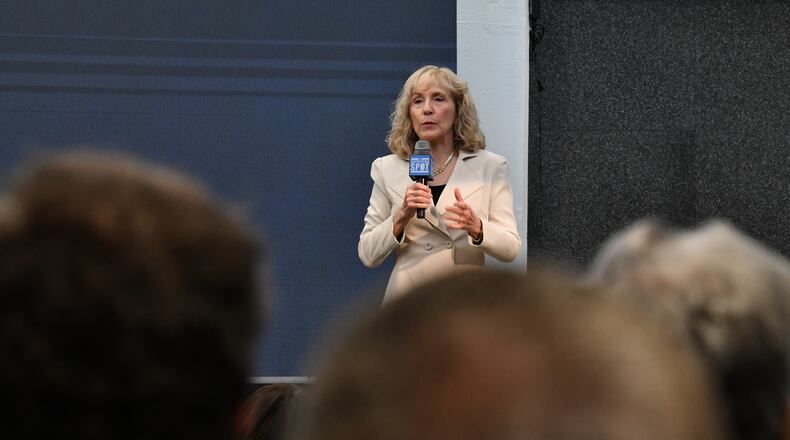One could call Sharon Gay an outside insider.
The Inman Park resident has never held elected office, but she’s deeply familiar with the inner workings of city hall, the city council and Atlanta’s boisterous constellation of Neighborhood Planning Units.
Once a top aide to Mayor Bill Campbell, Gay has spent the last two decades forging a reputation as a respected and well-connected attorney on land use, zoning and economic development issues for some of the city’s largest developers. She helped the interests behind Atlantic Station, Ponce City Market and Glenwood Place navigate the byzantine approval and financing process.
Now she wants to transition that behind-the-scenes know-how into the public sector as Atlanta’s 61st mayor.
“I understand how city government works,” the 42-year Atlanta resident said in a recent interview. “I know when it’s working well and when it’s not, but I’m not entrenched in the way it’s being done now. I can approach things with a fresh eye but also a different style.”
Gay has a sizable campaign war chest thanks to more than $1.1 million in personal loans, which she’s using to build name recognition in a sprawling field that includes several better-known public officials. She placed third in a September Atlanta Journal-Constitution poll with 6% of the vote but trailed well behind former Mayor Kasim Reed and City Council President Felicia Moore.
With 41% of voters reporting they were still undecided, Gay’s team has expressed optimism that they can close the gap.
Credit: HYOSUB SHIN / AJC
Credit: HYOSUB SHIN / AJC
After growing up in a small town in northern Alabama, Gay first moved to Atlanta to attend Emory Law.
She began volunteering on the mayoral campaign of Campbell, a fellow Vanderbilt graduate who at the time was her neighbor and city council representative. After the 1993 election, Gay was named Campbell’s deputy chief of staff, an inner-circle position in which she functioned as the mayor’s liaison to the city council. The job required building relationships with council members and navigating their egos, district priorities and pet projects.
She was extremely effective at the job, said Steve Labovitz, Gay’s boss at the time.
“Bill Campbell, even though he may have had troubles, he never lost a vote. No council ever rejected or vetoed anything like you’ve seen in Mayor Bottoms’ (term),” said Labovitz, who was Campbell’s chief of staff. “I believe it was because Sharon was able to work with city council.”
Among the Campbell administration’s biggest tasks during its first term was readying the city for the 1996 Olympics. Infrastructure needed to be repaired and permits approved. Officials had sweeping plans to transform long-neglected corners like Techwood Homes, a notorious public housing project located within a camera-sweep of Centennial Olympic Park and the athletes village near Georgia Tech.
Gay said that work sparked a career-long interest in development and affordable housing.
She left the mayor’s office at the end of Campbell’s first term, a few years before a federal corruption probe into the pay-to-play culture of city contracting enveloped the administration. In 2006, Campbell was convicted of failing to pay taxes on $160,000 of income and served 16 months in federal prison. Ten other aides were implicated.
Gay said the scandal was “disappointing on many levels” and that she “wasn’t there” for the corrupt dealings.
“I was never even interviewed by the FBI,” she said. “I didn’t know anything.”
Labovitz later helped recruit Gay to work for the law firm McKenna Long & Aldridge, now Denton’s.
She developed a reputation for pioneering the use of the state’s tax allocation districts in the late 1990s to build Atlantic Station.
The districts are a complex incentive that allows developers to temporarily divert school tax dollars for urban renewal projects in blighted areas, and quickly became popular — over the concerns of critics who warn they harm local budgets and primarily benefit big retailers and developers.
In 2008, Gay was at the center of a successful effort in the legislature to salvage the districts by paving the way for a constitutional amendment.
People who have been on the other side of the negotiating table from Gay agree that she’s smart and excels at what she does, but that there’s no doubt whose side she’s on.
“She’s a personable, pleasant person but absolutely unyielding in her advocacy for her clients,” said Jack White, a longtime member of the Virginia-Highland Civic Association’s planning committee. “She’s never been an advocate in my opinion for the neighborhoods.”
Some community leaders in northwest Atlanta were incensed by Gay’s first campaign ad, which credited her work as the outside counsel for the Atlanta Housing Authority as the city replaced the blighted Perry Homes housing project in the late 1990s. Those advocates said the ad exaggerated Gay’s role in the West Highlands development.
Gay defended her work during a recent debate, saying she “literally led” the effort to acquire the project financing through her work in the legislature to bolster the tax allocation districts.
Credit: Curtis Compton / Curtis.Compton@
Credit: Curtis Compton / Curtis.Compton@
One of Gay’s top priorities if elected mayor is building additional housing. She said she’d compel the housing authority to develop new affordable units and work with outside groups devoted to the issue, particularly in economically struggling neighborhoods with vacant housing. Gay would also designate “community quarterbacks” who can solicit feedback and help guide decision-making by elected officials.
Gay sees the recent surge of violent crime as an outcropping of the lack of housing and economic opportunity in certain neighborhoods.
“Ultimately, the way you reduce the formation of crime is create an environment where kids have an opportunity to make a better choice,” she said.
Gay has also touted a public safety plan that includes giving the police mayoral support to improve morale, boosting incentives to attract more law enforcement officers and cracking down on problem businesses that facilitate crime.
If elected, Gay would become Atlanta’s first white mayor in nearly 50 years. Gay said that fact was one of her biggest hesitations for entering the race, but she opted to do so because she felt like she shared “those same progressive, inclusive values” as Atlanta’s most transformative public figures.
“I would be a mayor for all of Atlanta,” she said.
Staff writers Wilborn P. Nobles III and J.D. Capelouto contributed to this article.
Profiling the candidates:
The Atlanta Journal-Constitution will publish deep profiles of the five major Atlanta mayoral candidates as part of the newspaper’s comprehensive coverage of the 2021 Race for City Hall. Those candidates garnered at least 1% support in a recent University of Georgia School of Public & International Affairs poll commissioned by the AJC. There are 14 candidates on the ballot. You can learn more about each of them by going to ajc.com and clicking on our page dedicated to coverage of the race for Atlanta mayor
We want to hear from you:
If you have tips to share, questions for the candidates or if you want to tell us how you think we are doing in covering the race for mayor, please write us at atlantamayorsrace@ajc.com.
To view all of the AJC’s coverage of the 2021 Atlanta elections, go to https://www.ajc.com/news/atlanta-mayors-race-2021/
Schedule of Profiles:
Monday: Atlanta City Councilman Antonio Brown
Tuesday: Atlanta City Councilman Andre Dickens
Wednesday: Attorney Sharon Gay
Thursday: Atlanta City Council President Felicia Moore
Friday: Former Atlanta Mayor Kasim Reed
About the Author
Keep Reading
The Latest
Featured






